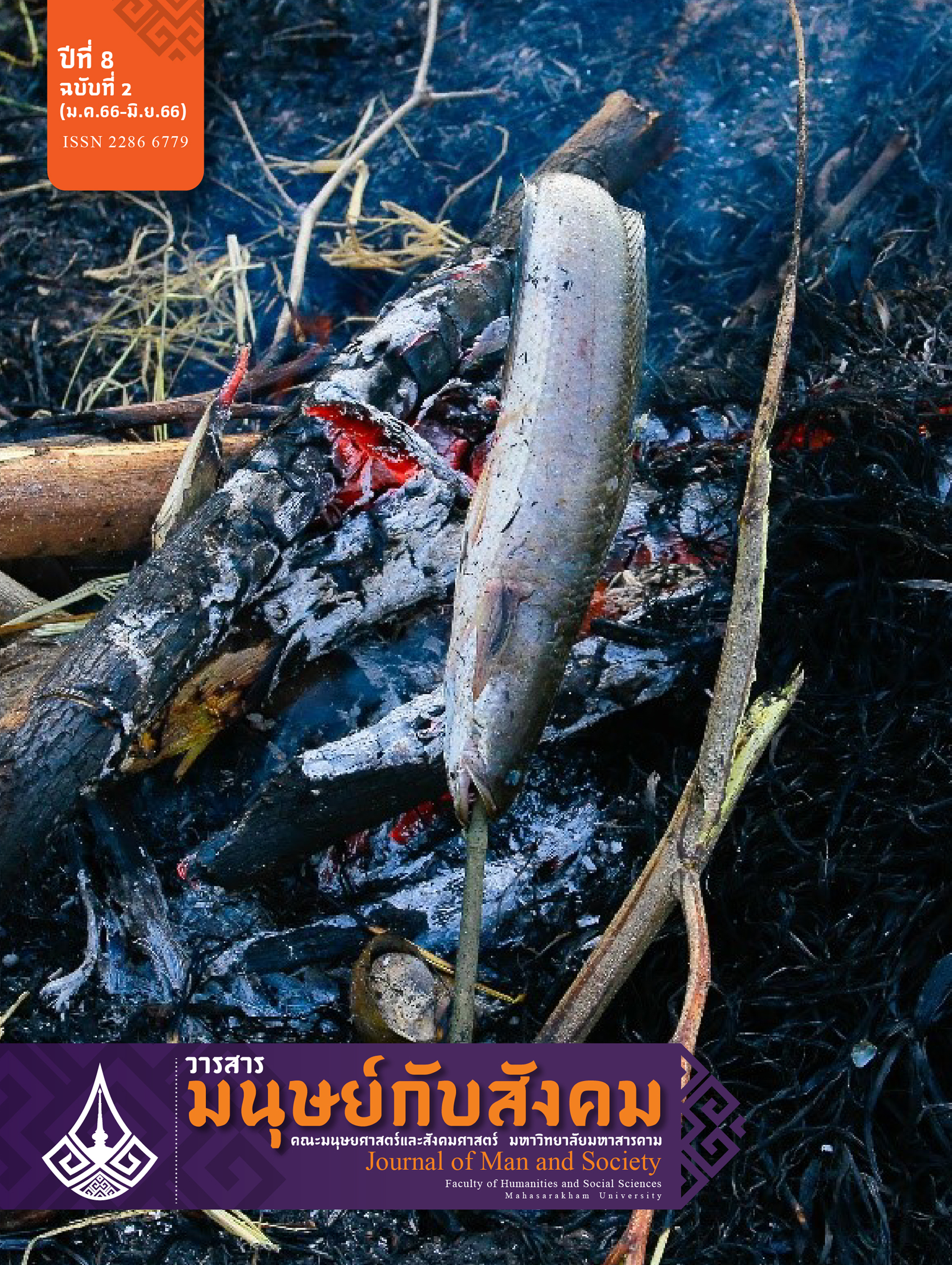เรื่องเล่าลาวพลัดถิ่นในวรรณกรรมลาวหลังการเปลี่ยนแปลงการปกครอง
Main Article Content
บทคัดย่อ
บทความนี้มีวัตถุประสงค์เพื่อศึกษาภาพคนลาวพลัดถิ่นในมิติต่าง ๆ ผ่านเรื่องเล่าในวรรณกรรมลาวหลังการเปลี่ยนแปลงการปกครอง โดยจะศึกษาจากวรรณกรรมซึ่งเป็นผลงานของ บุนเสิน แสงมะนี ผ่านวรรณกรรมประเภทเรื่องสั้นและนวนิยาย ที่มีความโดดเด่น อย่างละ 1 เรื่องเพื่อเป็นตัวแทนของผลงานทั้ง 2 รูปแบบ โดยผู้ศึกษาได้คัดเลือกเรื่องสั้นที่ได้รับรางวัลซีไรต์ชุด “ประเพณีและชีวิต” และนวนิยายเรื่อง “สายน้ำที่บ่ไหลย้อนกลับ” โดยมุ่งจะเสนอผ่านทัศนคติของนักเขียนใน 4 ประเด็น ได้แก่ การสร้างชาติตามอุดมการณ์ของพรรครัฐ การสร้างฐานะทางสังคมสมัยใหม่ การถูกเบียดขับเป็นคนชายขอบ และการสืบทอดวัฒนธรรมประเพณี ผลการศึกษาพบว่า การสร้างชาติตามอุดมการณ์ของพรรครัฐ พบการนำเสนอภาพของความรักชาติ การมีการศึกษา ความภาคภูมิใจในอาชีพ การสร้างฐานะทางสังคมสมัยใหม่ พบการนำเสนอภาพของการสร้างฐานะด้วยการใช้ทรัพย์สินเงินทอง และการใช้การศึกษาเป็นบันไดไปสู่การสร้างฐานะทางสังคม การถูกเบียดขับ เป็นคนชายขอบ พบการนำเสนอภาพของการถูกหลอกลวง ปัญหาชีวิตความเป็นอยู่ในต่างแดน ส่วนการสืบทอดวัฒนธรรมประเพณี พบการนำเสนอภาพของการสืบทอดจารีตประเพณีที่ไม่ขัดกับนโยบายในการพัฒนาประเทศ การปฏิเสธจารีตประเพณีที่ขัดกับนโยบายในการพัฒนาประเทศ
Article Details

อนุญาตภายใต้เงื่อนไข Creative Commons Attribution-NonCommercial-NoDerivatives 4.0 International License.
เนื้อหาและข้อมูลที่ตีพิมพ์ลงในวารสารมนุษย์กับสังคม ถือเป็นข้อคิดเห็นและความรับผิดชอบโดยตรงของผู้เขียนซึ่งกองบรรณาธิการวารสารไม่จำเป็นต้องเห็นด้วยหรือร่วมรับผิดชอบใดๆ
บทความ ข้อมูล เนื้อหา รูปภาพ ฯลฯ ที่ได้รับการตีพิมพ์ในวารสารมนุษย์กับสังคม ถือเป็นลิขสิทธิ์ของวารสาร หากบุคคลหรือหน่วยงานใดต้องการนำทั้งหมดหรือส่วนหนึ่งส่วนใดไปเผยแพร่ต่อหรือเพื่่อกระทำการใดๆ จะต้องได้รับอนุญาตเป็นลายลักษณ์อักษรจากวารสารมนุษย์กับสังคมก่อน
เอกสารอ้างอิง
จิราภรณ์ อัจฉริยะประสิทธิ์. (2557). เรื่องเล่ากับสภาวะพลัดถิ่นในวรรณกรรมหลังยุคสงครามเย็นของนักเขียน เวียดนาม กัมพูชา และม้ง-ลาว. [วิทยานิพนธ์ปริญญาอักษรศาสตรดุษฎีบัณฑิต, จุฬาลงกรณ์ มหาวิทยาลัย].
บุนเสิน แสงมะนี. (2005). ประเพณีและชีวิต. เวียงจัน: โรงพิมพ์สีสะหวาดการพิมพ์.
บุนเสิน แสงมะนี. (2013). สายน้ำที่ไม่ไหลย้อนกลับ. เวียงจัน: โรงพิมพ์สีสะหวาดการพิมพ์.
พชรวัฒน์ เส้นทอง. (2562). อุดมการณ์ทางการเมือง : อุดมการณ์ทางการเมืองไทย. วารสารบัณฑิตศึกษา มหาวิทยาลัยราชภัฏวไลยอลงกรณ์ ในพระบรมราชูปถัมภ์, 13(3), (230-248).
สถาบันค้นคว้าวิทยาศาสตร์การศึกษา. (2007). เอกสารรายงานของสถาบันค้นคว้าวิทยาศาสตร์การศึกษาเรื่อง “30 ปี แห่งการสร้างตั้งและเติบใหญ่ขยายตัวของสถาบันค้นคว้าวิทยาศาสตร์การศึกษา”. เวียงจัน: สถาบันค้นคว้าวิทยาศาสตร์การศึกษาแห่งชาติ.
สุพัชรี เมนะทัต. (2561). วรรณศิลป์ อำนาจ และการต่อสู้ทางการเมืองในวรรณกรรมของกะต่าย โดนสะโสริท. [วิทยานิพนธ์ปริญญาอักษรศาสตรดุษฎีบัณฑิต, จุฬาลงกรณ์มหาวิทยาลัย].
อุมมีสาลาม อุมาร. (2558). พัฒนาการเรื่องสั้นลาว. วารสารรูสมิแล, 36(2), 6-17.
อุมารินทร์ ตุลารักษ์. (2548). วรรณกรรมปฏิวัติลาว: มโนทัศน์และพัฒนาการ. วารสารมนุษยศาสตร์สังคมศาสตร์, 23(1): 56-81.
อุมารินทร์ ตุลารักษ์. (2553). ผู้หญิงกับการเปลี่ยนแปลงทางสังคมในวรรณกรรมลาวร่วมสมัย ใน เอกสารประกอบการประชุมวิชาการนานาชาติ “วรรณคดีและวรรณคดีเปรียบเทียบ ครั้งที่ 2” จัดโดยหลักสูตรอักษรศาสตรดุษฎีบัณฑิต สาขาวิชาวรรณคดีและวรรณคดีเปรียบเทียบ ศูนย์วรรณคดีศึกษา คณะอักษรศาสตร์จุฬาลงกรณ์มหาวิทยาลัย 18-19 สิงหาคม 2553.
อุมารินทร์ ตุลารักษ์. (2555). “เรื่องสั้นวรรณกรรมซีไรต์ลาว “ใบไม้ใบสุดท้าย” ใน ทรงวิทย์ พิมพะกรรณ์ (บรรณาธิการ), หนังสือรวมบทความ “ฮักแพงแจ้งใจ”. ขอนแก่น: สมาคมไทย-ลาว เพื่อมิตรภาพ.


